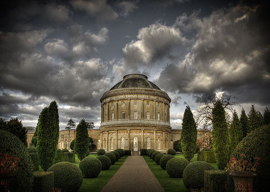
December 30, 2011

Ickworth House
With the aristocracy, riches were fused to status and an almost ineradicable sense of entitlement. Until 1876—barely a moment ago in terms of mankind’s plod toward civilization—two-thirds of the British Isles was owned by 11,000 people (or 7,500, according to another estimate). The tenants who farmed that land paid rents that had been rising continuously since 1800. The rewards were stupendous: The 9th Duke of Bedford, for instance, enjoyed an annual income of about $300 million in today’s money. The aristocracy dominated governments, Liberal and Conservative alike. Yet a generation later, this ruling class had become, as the 11th Duke of Devonshire (1920-2004) put it, a “spent force.”
A nice little technological innovation killed it off: refrigeration. From about 1875, newfangled refrigerated ships imported American grain and New World meat into Britain in good condition. Import prices undercut the produce being taken to market by the aristocracy’s tenant farmers, who, in consequence, couldn’t—or wouldn’t—pay their rents.
Aristocratic incomes plunged. Many, blithely presuming that rents could only rise, were mortgaged to the hilt. In the subsequent scramble to survive, they developed a keen appetite for wives with undiminished fortunes, often American ones—the solution favored by the fictional Earl of Grantham in Downton Abbey.
Ruling classes are, however, usually adroit at looking after themselves, even at the moment of their defenestration. Successive governments—Liberal and Conservative—accordingly passed a series of Land Acts which made huge amounts of taxpayers’ money available to tenant farmers, enabling them to buy the land they farmed. Millions of acres changed hands. Aristocrats’ immediate financial fears abated, but with their status massively and very publicly diminished.
In the century or so since then, many have learned to define themselves by their accomplishments. The policeman in charge of the Royal Protection Squad likes to be known as Peter Loughborough, though he is the 7th Earl of Rosslyn, great-grandson of the twice-bankrupted 5th Earl. It is a happy bonus that the family estates, though much reduced, still include Rosslyn Chapel of Da Vinci Code renown.
Many other aristocrats, however, most closely resemble recipients of what the British ineptly describe as state “benefits”—determined to inoculate themselves against reality via alcoholic or narcotic release, unable to accept responsibility for their actions: “You made me do it.” The only difference is that they’re locked onto a trust-fund teat rather than a welfarist one.
Splendour & Squalor: The Disgrace and Disintegration of Three Aristocratic Dynasties by Marcus Scriven is published by Atlantic Books.